Arrest rates were twice as high at Notting Hill Carnival than the Unite the Kingdom march, figures suggest.
Twenty-five demonstrators were detained as tensions flared during what is thought to be the largest Right-wing rally in British history on Saturday.
Up to 150,000 protesters, many of whom were draped in St George’s flags, brought London to a standstill as they marched through the capital’s streets demanding the unfolding migrant crisis is brought under control.
Police claimed they faced ‘unacceptable violence’ as they scrambled to bring the Tommy Robinson-organised event under control, wielding their batons and pinning demonstrators to the ground.
If the Metropolitan Police‘s attendance estimates are correct, it means around one in every 6,000 attendees were arrested – or 1.7 in every 10,000.
There were 24 arrests made on the day with eight people charged for a range of public order, assault on an emergency worker and criminal damage offences.
Officers were kicked, punched and faced hurled bottles, flares and other projectiles. Twenty-six suffered injuries, which included broken teeth, a possible broken nose, a concussion, a prolapsed disc and a head injury.
In comparison, there were 423 arrests over the two days of Notting Hill Carnival last month.
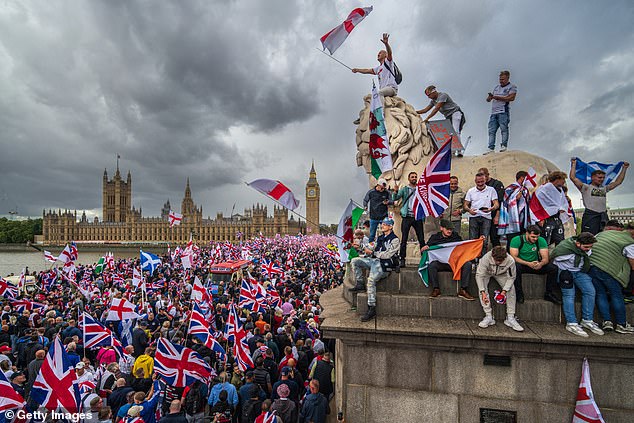
Twenty-four demonstrators were detained as tensions flared during what is thought to be the largest Right-wing rally in British history on Saturday
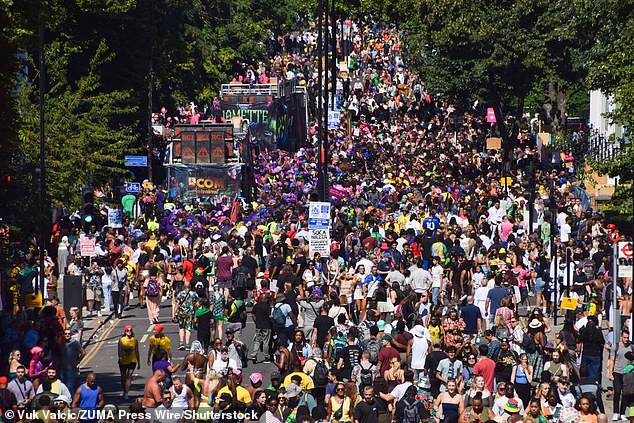
There were 423 arrests over the two days of Notting Hill Carnival last month
Attended by over a million people, that equated to one in every 2,364 partygoers, or 4.3 in every 10,000, being arrested.
However, the attendance estimate for Notting Hill Carnival – by far Europe’s biggest street party – is also disputed.
The apparent contrast in the level of arrests between the two events comes despite several politicians’ issuing statements of condemnation on the Right-wing march.
Keir Starmer wrote on X, formerly known as Twitter,: ‘People have a right to peaceful protest. It is core to our country’s values.
‘But we will not stand for assaults on police officers doing their job or for people feeling intimidated on our streets because of their background or the colour of their skin.
‘Britain is a nation proudly built on tolerance, diversity and respect.
‘Our flag represents our diverse country and we will never surrender it to those that use it as a symbol of violence, fear and division.’
Home Secretary Shabana Mahmood also condemned the violent scenes and vowed that anyone ‘taking part in criminal activity will face the full force of the law’.
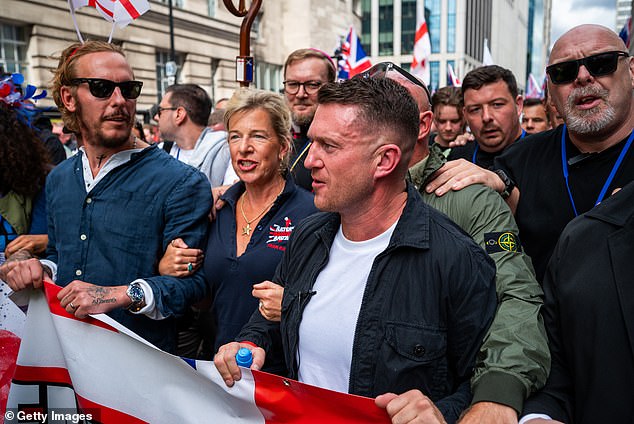
Tommy Robinson (right) seen carrying a banner alongside Katie Hopkins (centre) and former actor Laurence Fox (left)
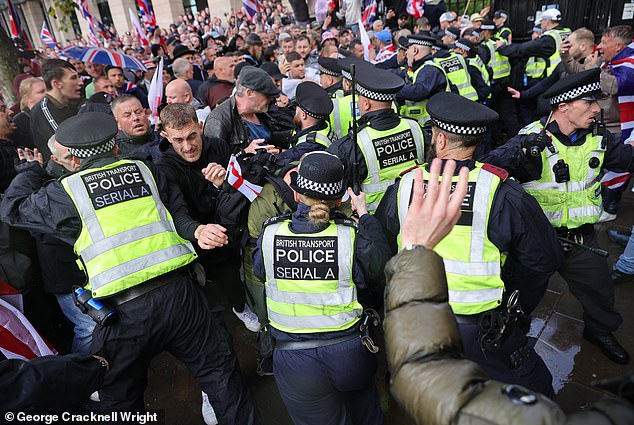
Clashes between police and protesters broke out after a crush near Westminster Bridge on Saturday
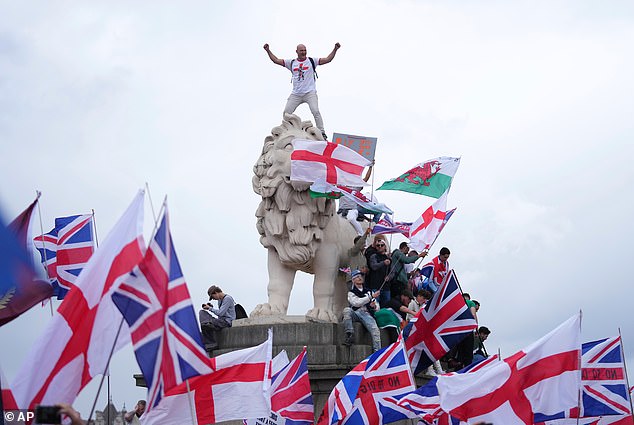
Pictured: A demonstrator stands on the head of the South Bank lion that sits on the side of Westminster Bridge
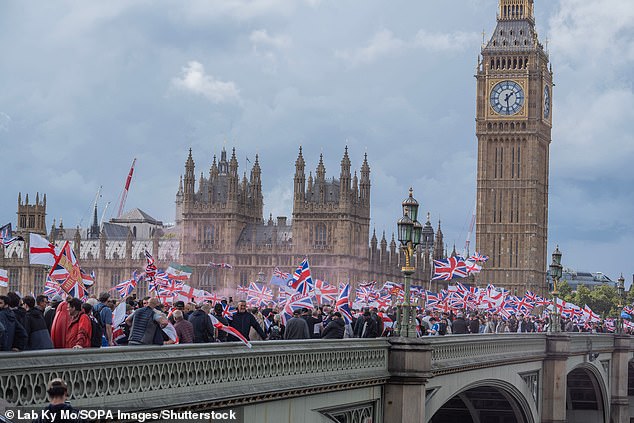
Patriots cross Westminster bridge holding aloft Union Flags during the rally on Saturday
A huge policing operation was needed in central London with the Met deploying 1,000 officers and drafting in an additional 500 from forces across the country, including Leicestershire, Nottinghamshire and Devon and Cornwall.
The Met said the 25 arrests they have made as of 4.30pm on Monday were ‘just the start’, but that comparisons between Saturday’s march and Notting Hill Carnival are difficult to make because they are policed differently.
Matt Twist, assistant commissioner at the Met, said: ‘There is no doubt that many came to exercise their lawful right to protest, but there were many who came intent on violence.
‘They confronted officers, engaging in physical and verbal abuse and making a determined effort to breach cordons in place to keep everyone safe.
‘The violence they faced was wholly unacceptable.
‘The 25 arrests we have made so far is just the start. Our post-event investigation has already begun – we are identifying those who were involved in the disorder and they can expect to face robust police action in the coming days and weeks.’
At Notting Hill Carnival, the Met deployed an army of black-clad police officers to line the streets to keep order at the festival, which has become increasingly linked with violence and disorder.
Police also put up knife arches to detect weapons at the busiest entry points and used live facial recognition cameras to locate people on watch lists.
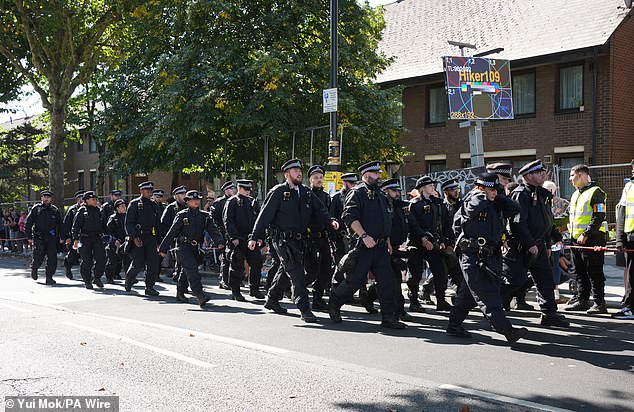
An army of black-clad police officers lined the streets for Notting Hill Carnival after the festival had recently been linked with violence and disorder
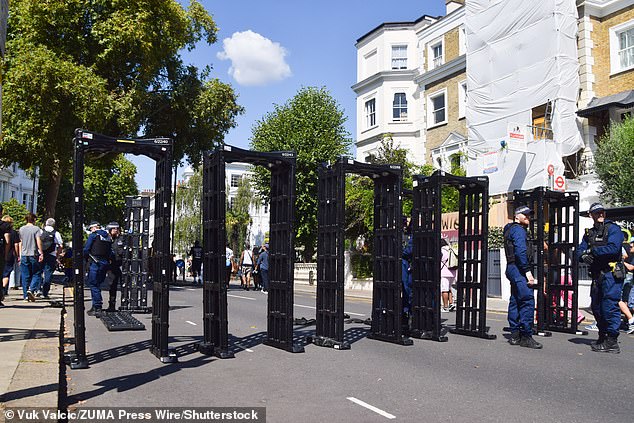
This year at Notting Hill Carnival, police put up knife arches to detect weapons at the busiest entry points and used live facial recognition cameras to locate people on watch lists
No such technology was in use at the Unite the Kingdom march, which began near Waterloo Bridge before making their way to the southern end of Whitehall.
The organiser of Saturday’s march, anti-immigrant and anti-Muslim activist Robinson, real name Stephen Yaxley-Lennon, claimed on X that there were ‘three million patriots’.
He attacked news outlets for reporting the police estimate of between 110,000 and 150,000, claiming the ‘legacy media is proving again they’ll just lie to your face for their own agenda’ and that ‘this is why nobody trusts them’.
A counter-protest organised by group Stand Up To Racism (SUTR) was also formed by around 5,000 people, according to official Met Police figures.
Police rejected the three million claim as impossible, citing the capital’s infrastructure.
A Met spokesperson said: ‘We had 1,000 officers on duty managing routes, and our counts are based on real-time monitoring.’
The historic benchmark of large London protests is the 2003 anti-Iraq War march, which drew 1.5million.
When asked about the 26 police officers who were injured at the march on Saturday, Reform UK leader Nigel Farage said it was ‘horrendous’.
He said: ‘People will say it is not as bad as Notting Hill, not as bad as other demonstrations, but it is horrible, it is bad.
‘I feared something like that would happen. There is no defence of the use of violence that some people used on Saturday.
‘But I do repeat, the vast majority of people who caught the train to London that day were good, ordinary, decent people.’
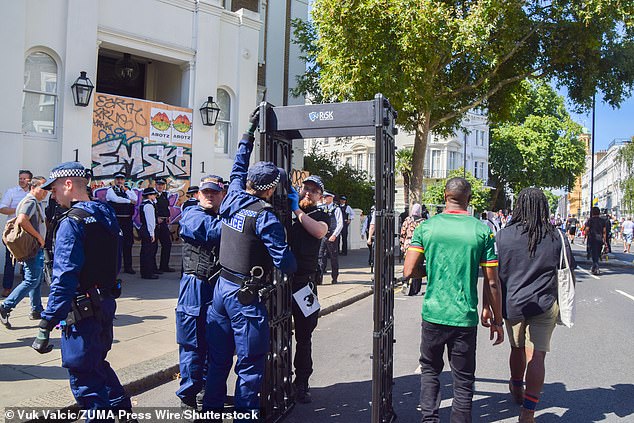
Knife arches were seen being set up by police in the lead up to Notting Hill Carnival
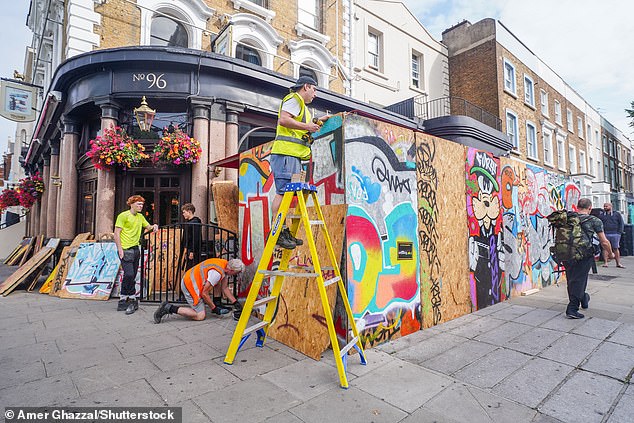
Workers boarded up pubs on Ladbroke Grove before the start of Notting Hill Carnival
Meanwhile, as Notting Hill Carnival is a free and non-ticketed event sprawling across an entire neighbourhood, it is also difficult to put an exact figure on attendance.
Most have the figure at around one to two million people over the course of the two-day event, which takes place on a Sunday and Bank Holiday Monday in late August.
This year’s celebrations involved widespread disregard for the law, with men seen dancing on top of a bus stop and urinating in the streets.
Shopkeepers have grown weary of the festival, with stores along major routes having to board up their windows in preparation for any crime and disorder.
One shopkeeper who was forced to close said: ‘I dread it each year. It’s hell. I’m bracing myself for mayhem.’
This year, there were two stabbings, but the Met said neither led to serious injury.
However last year eight people were stabbed, leaving one person dead, while another person was killed in a separate attack.
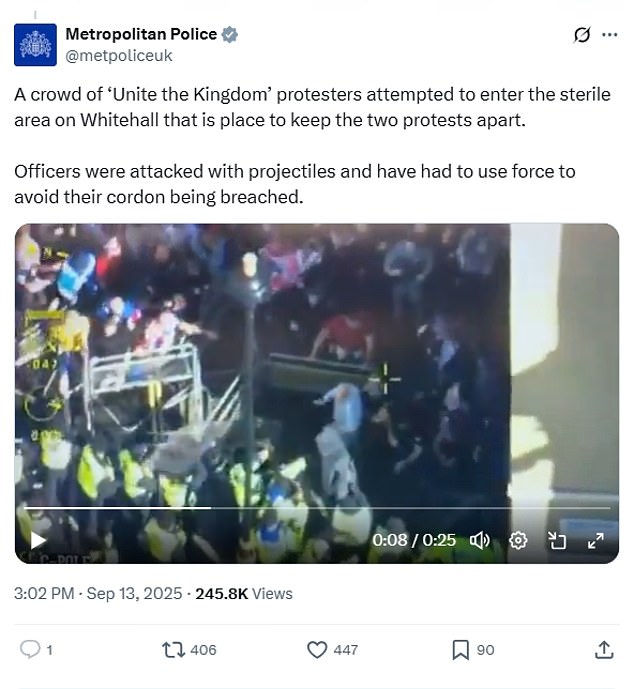
The Met Police said they were obliged to use force after Unite The Kingdom protesters attempted to breach the cordon separating them from counter-protesters
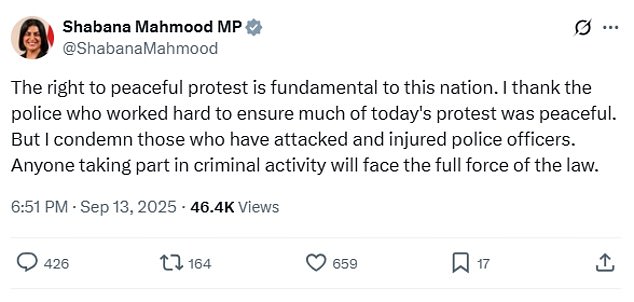
Home secretary Shabana Mahmood posted on X that ‘the right to peaceful protest is fundamental to this nation’ but that those who assaulted police officers or took part in criminal activity ‘will face the full force of the law’
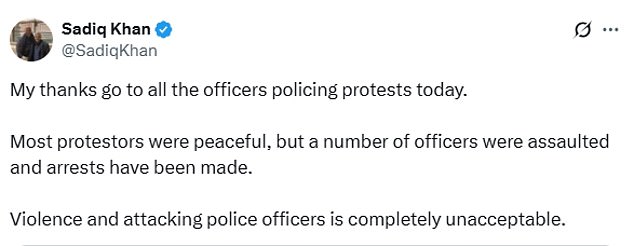
London mayor Sadiq Khan thanked Met officers for policing the protest and described the violence against them as ‘completely unacceptable’
The most common reasons for arrest were for cannabis possession, possession of an offensive weapon, and drug supply.
The Met said 52 of the arrests over the two days were the result of identifications using live facial recognition.
The annual celebration has been running since 1966, and arrest totals have been on a rising curve since the start of the millennium. The total over the past 20 years, between 2005 and 2024, is now well over the 5,000 mark.
In previous years, politicians such as Nigel Farage have suggested the annual festival should be cancelled due to the ‘litany’ of offences that take place there.
Notting Hill Carnival has previously said it has worked to improve things by listening carefully to the Metropolitan Police’s concerns – leading to numerous changes this year.
The festival also points out that the Mayor of London says it contributes around £400million annually to the economy – far more than the roughly £11.7million it costs the Met to police.
Notting Hill Carnival has been contacted for further comment.
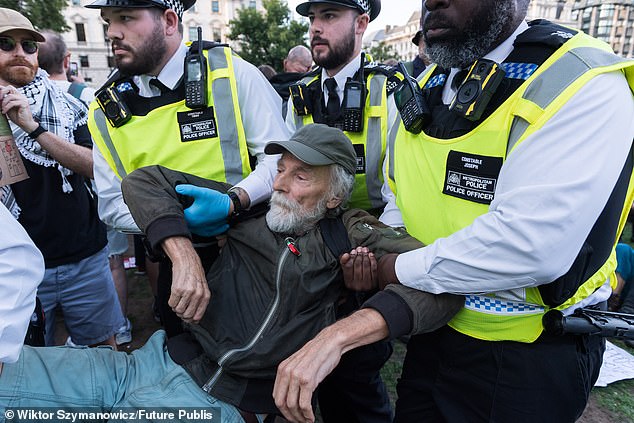
Protesters lay on the ground in Parliament Square holding signs reading ‘I oppose genocide. I support Palestine Action’ on Saturday, September 6

Police officers take away a protester during a mass demonstration in Parliament Square against the ban on Palestine Action in London
However the most recent public event which led to the highest number of arrests by far was the rally for Palestine Action on Saturday, September 6.
There were 890 people arrested at a demonstration against the ban on the group in London, the Metropolitan Police said.
The government proscribed Palestine Action a terrorist group in July after its activists broke into an RAF base and damaged two military aircraft earlier this year.
Nevertheless an estimated 1,500 took part in the Parliament Square protest, despite membership being punishable by up to 14 years in prison – leading to mass arrests.












